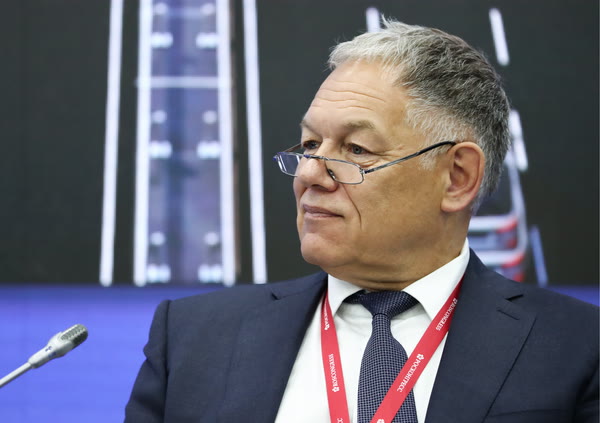
Digital Transport and Logistics: Russia’s Leading Position in the Transport Integration of Europe and Asia
KEY CONCLUSIONS
Introducing digital technology significantly increases the efficiency of transport systems
“Digital technology will help to increase the productivity of transport systems, their quality and safety, without large investments in infrastructure,” Alexey Semenov, Deputy Minister of Transport of the Russian Federation.
“Introducing digital technologies will fundamentally change the very system of commercial transportation, it will benefit safety, ecology, energy efficiency, which ultimately should transform into direct economy, providing effect to end users,” Sergei Yavorski, General Director, Volvo Vostok.
“The world is facing a transport revolution, which will affect the way all of us move and live and, of course, the movement of goods everywhere. The product delivery algorithm will also change,” Richard Threlfall, Partner, Global Head of Infrastructure, KPMG.
Russian transport companies actively use digital platforms
“We are working in 16 countries already. Most recently we launched in Finland, Israel and Côte d’Ivoire,” Daniil Shuleyko, General Director, Yandex.Taxi.
“We work for the safety of our customers’ air travel. And since our key Russian client, Aeroflot, has already joined the Association and is clearly preparing for digital transformation, we primarily want to be close with our client, to understand its future demands and change together with them,” Nikita Danilov, Deputy Chief Executive Officer, State ATM Corporation.
“We see a handful of projects in launching autonomous cars on public roads. Most commonly, those are regular cars equipped with machine vision: an additional on-board computer that makes decisions, but in essence it is trying to simulate our human imperfection. <...> Therefore, over the past 2.5 years we have been working on a project of a smart road for autonomous cars,” Aleksey Nashchekin, Chief Executive Officer, National Telematic Systems.
"Our first pilot project [of testing technologies and infrastructure for unmanned vehicle traffic, – Ed.] will be launched <...> on M-11," Vyacheslav Petushenko, Chairman of the Board, Russian Highways State Company.
PROBLEMS
Digital platforms in different countries are not interconnected
“Speaking about creating a trusted environment <...>, the data [of digital platforms operating in different countries, – Ed.] can be used as reference, but it cannot be used by government agencies for making decisions [to provide access to services on other platforms, – Ed.] <...> This is the key problem which we need to take over to the ECO, SCO <...> From the technological standpoint, we are ready,” Anton Zamkov, General Director, RT-Invest Transport Systems.
“Russia has gone far ahead <...> Our foreign partners are at different stages of building a digital environment,” Evgeny Charkin, Information Technology Director, Russian Railways.
Lack of regulatory framework
“The legislative and regulatory framework is very important. We are not going to go far unless we persuade the participants of the process to interact on a common platform,” Sergey Shishkarev, President, Delo Group of Companies.
Personnel are not properly qualified
“The cargo cult problem hinders implementation, and the practical results and benefits from information systems in case of a strong discrepancy between the level of organizational and cultural development of a company and the level of information technologies, prevents obtaining real economic benefits and results from information systems,” Sergey Likharev, Vice President for Logistics, NLMK.
SOLUTIONS
Providing regulatory and technological conditions for seamless transportation
“We have to remove administrative barriers at the border, provide seamless transportation, organize a clear information and navigation support of the transport system, provide a unified and secure digital environment, a kind of a space where services could be established, so that a carrier has no problem moving across the Russian Federation,” Alexey Semenov, Deputy Minister of Transport of the Russian Federation.
“I would like to mention the technology of end-to-end cargo tracking, which we are building <...> We have connected containers, road vehicles, sea transport and railways. And we believe that, along with the technology of identification seals and electronic document management, this should be the basis for building a multi-modal unified transport and logistics environment,” Evgeny Charkin, Information Technology Director, Russian Railways.
“Logistics is cooperation; there are no operators who would be doing everything on their own <...> Today, the postal services of 196 countries work using the same documents, the same data, the same standards. <...> This experience should be studied,” Aleksey Skatin, Deputy General Director, The Federal State Unitary Enterprise Russian Post.
Combining the efforts of government and businesses to promote new technologies
“New technologies give us the opportunity to meet our clients’ demands and turn challenges into victories, but it is only in close integration with the government that can we make the world a little more convenient and safe for our passengers,” Pavel Voronin, Deputy General Director for Information Technology, Siberia Airlines.
“Digital transformation of the industry is our common task. Without developing common stances and end-to-end solutions, it is impossible to introduce new technologies <...> Our strategy involves participating in the digital transformation for the benefit of the industry as a whole,” Roman Kravtsov, General Director, TransTeleCom.
“Consumers need routes that are equipped with modern online services that would make those routes safe, transparent, and multimodal. The main role would be played by the unified digital transport environment, which businesses and government must create together,” Viktor Parakhin, Deputy General Director, ZaschitaInfoTrans of the Ministry of Transport of the Russian Federation.
For more information, visit the Roscongress Foundation's Information and Analytical System at roscongress.org/en.








